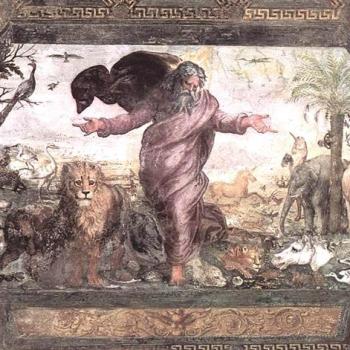I want to draw attention to how this message is radically different from the message offered to us by the God of the Judeo-Christian tradition. The Bible has similar passages where God announces his presence to someone. Moses encountering the burning bush is a well-known example. But after that elemental foundation is established, the message continues in a different kind of way. In every case, and with no exceptions that I can think of, the presence and the revelation of God, in the Judeo-Christian tradition, establishes a social and political order. You can see this in the story of the life of Abraham, who asserts that the proper relationship between God and humanity is a kind of contract. It's in the story of Moses, who also returns from his encounter with God with ten social and political laws for people to follow. Jesus Christ's most important teachings do not concern presence alone, but rather they specific moral teachings. The Beatitudes, the Golden Rule ("do unto others . . ."), the Great Commandment ("love your neighbor") and the various instructions he leaves for his apostles at the last supper, and finally the Great Commission (to spread the gospel, make converts, etc.) are all principles of a primarily political nature. Some of those laws given by these figures are obviously good laws. The commandment "Thou shall not kill" is an instance of the basic movement of civilization, from killing to culture, which I mentioned earlier. Yet in the Judeo-Christian tradition, this movement is presented in the mode of laws and commandments. The civilization of the goddess is not like that.
The primary difference, I think, is only partly a matter of the values themselves. It is also the manner in which the values are presented. In a patriarchal model of civilization, the values take the form of laws, and these laws are enforced with deterrents. If you break one of the laws, you might be compelled to pay a fine, or to go to jail, or to do some kind of compensatory work. On the religious dimension, if you break the divine laws, then after you die you will be punished in hell.
What I'd like to suggest is that a society that affords real priority to the goddess, and to her way of presenting the revelation of her divine presence, is likely to be a society where the values are cast not as rules or laws. It is likely to be a society in which the values are cast in the form of character-virtues. I think this is so because her message is not a commandment to be obeyed: her message is a presence to be experienced. Her message tells us who she is, not what to do. This means that following orders and rules and laws will not be what matters. What will matter instead, is finding all the places where her presence can be experienced. I think it will also matter that we live our lives in a way that embodies the presence of the goddess.
What matters is being a particular kind of person. At the most basic level, it matters that you are the kind of person who resolves problems with force of thought and feeling instead of with the force of arms. Such a person becomes able to find the goddess within her relationships, and within herself. In the culture of the goddess, there are no rules and commandments, but there still is an ethical understanding, in which some character-values reveal the goddess within, and others do not; some kinds of habits and choices are exemplary of the goddess, and others are not. Except for a few things, like gratuitous murder, there will be little need for absolute categorical distinctions. The ethical understanding can be a matter of degree. Furthermore, since the goddess reveals herself in many different masks and disguises, there can be more than one ethically significant way to embody her presence. There doesn't have to be only one true way; there can be many true ways. The goddess doesn't tell you what to do; but rather she shows you different possibilities for what kind of a person you can be.




